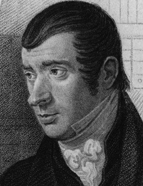

José Liberato Freire de Carvalho – better known as José Liberato or simply Liberato – was one of the most prominent Portuguese memoirists and publicists of the 19 th century, spreading his activity across areas such as political and cultural journalism, historiography, oratory , and parliamentary archives. According to Inocêncio, ‘he was born in Quinta de Montesão, in the suburbs of Coimbra, on 20 July 1772’ (Inocêncio Francisco da Silva, Dicionário Bibliográfico Português… [Portuguese Bibliographical Dictionary] , vol. IV, 1860, p. 417).
The son of Dr Aires António Antunes Freire and Maria Joaquina Sequeira de Carvalho, two of his brothers – D. António da Visitação Freire de Carvalho (1769-1804) and Francisco Freire de Carvalho (1779-1854) were also prominent in the world of literature, both having been members of the Academia das Ciências de Lisboa, with outstanding academic output. The former, a regular canon of St Augustine, taught history and geography at the monastery of São Vicente de Fora. The second, a hermit of St Augustine, taught History and Antiquities at the School of Arts in Coimbra. A third brother, Luís António Freire de Carvalho (1766-1833), met a tragic fate for political reasons: ‘after having all his possessions confiscated, lost and devoured since 1828 and [...] [being] imprisoned in 1832’, he died in the Tomar prison during the reign of D. Miguel (José Liberato Freire de Carvalho, Memórias … , 1855, p. 360). The example of his older brothers clearly marked José Liberato, who joined the monastery of São Vicente de Fora, where he lived with D. António da Visitação. From an early age, he showed a deep love of History and Antiquity, while at the same time observing the customs and realities of the world outside the monastery walls. His formal studies were limited to ecclesiastical studies (Theology and Philosophy), combined with a variety of historical and political readings on a self-taught basis.
Liberato, a man of culture and freedom, severed all ties with the threefold ecclesiastical, academic and political reality of his time: he abandoned his religious status (like his brother Francisco Freire), going into exile in London (1813); he resigned, towards the end of his life, as a member of the Academia das Ciências, due to a change in the articles of association that downgraded him from full member to correspondent, the category with which he had joined the institution almost fifty years earlier (1853); and fought, through the force of his writing and his ideals, not only against the maintenance of the Ancien Régime in Portugal (especially Miguelism) but also against the deviations of the Chartist regime itself, whose censorship prevented him from being elected to parliament for the fifth time in 1840.
This work is financed by national funds through FCT - Foundation for Science and Technology, I.P, in the scope of the projects UIDB/04311/2020 and UIDP/04311/2020.
